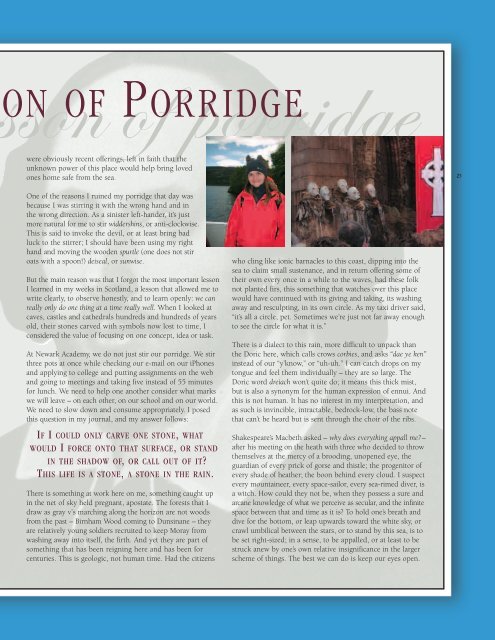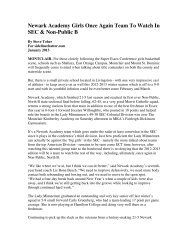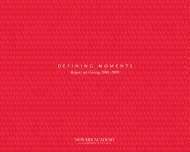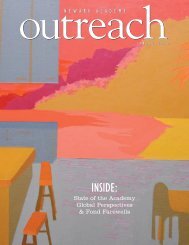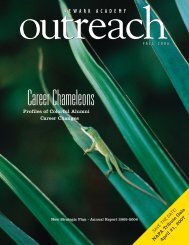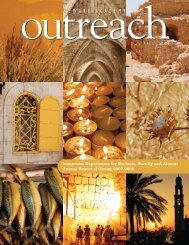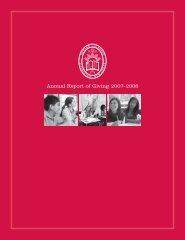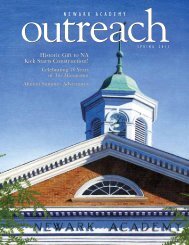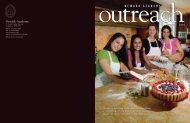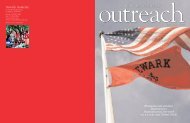Donald M.Austin - Newark Academy
Donald M.Austin - Newark Academy
Donald M.Austin - Newark Academy
Create successful ePaper yourself
Turn your PDF publications into a flip-book with our unique Google optimized e-Paper software.
sonof porridge<br />
ON OF PORRIDGE<br />
were obviously recent offerings, left in faith that the<br />
unknown power of this place would help bring loved<br />
ones home safe from the sea.<br />
One of the reasons I ruined my porridge that day was<br />
because I was stirring it with the wrong hand and in<br />
the wrong direction. As a sinister left-hander, it’s just<br />
more natural for me to stir widdershins, or anti-clockwise.<br />
This is said to invoke the devil, or at least bring bad<br />
luck to the stirrer; I should have been using my right<br />
hand and moving the wooden spurtle (one does not stir<br />
oats with a spoon!) deiseal, or sunwise.<br />
But the main reason was that I forgot the most important lesson<br />
I learned in my weeks in Scotland, a lesson that allowed me to<br />
write clearly, to observe honestly, and to learn openly: we can<br />
really only do one thing at a time really well. When I looked at<br />
caves, castles and cathedrals hundreds and hundreds of years<br />
old, their stones carved with symbols now lost to time, I<br />
considered the value of focusing on one concept, idea or task.<br />
At <strong>Newark</strong> <strong>Academy</strong>, we do not just stir our porridge. We stir<br />
three pots at once while checking our e-mail on our iPhones<br />
and applying to college and putting assignments on the web<br />
and going to meetings and taking five instead of 55 minutes<br />
for lunch. We need to help one another consider what marks<br />
we will leave – on each other, on our school and on our world.<br />
We need to slow down and consume appropriately. I posed<br />
this question in my journal, and my answer follows:<br />
IF I COULD ONLY CARVE ONE STONE, WHAT<br />
WOULD I FORCE ONTO THAT SURFACE, OR STAND<br />
IN THE SHADOW OF, OR CALL OUT OF IT?<br />
THIS LIFE IS A STONE, A STONE IN THE RAIN.<br />
There is something at work here on me, something caught up<br />
in the net of sky held pregnant, apostate. The forests that I<br />
draw as gray v’s marching along the horizon are not woods<br />
from the past – Birnham Wood coming to Dunsinane – they<br />
are relatively young soldiers recruited to keep Moray from<br />
washing away into itself, the firth. And yet they are part of<br />
something that has been reigning here and has been for<br />
centuries. This is geologic, not human time. Had the citizens<br />
who cling like ionic barnacles to this coast, dipping into the<br />
sea to claim small sustenance, and in return offering some of<br />
their own every once in a while to the waves, had these folk<br />
not planted firs, this something that watches over this place<br />
would have continued with its giving and taking, its washing<br />
away and resculpting, in its own circle. As my taxi driver said,<br />
“it’s all a circle, pet. Sometimes we’re just not far away enough<br />
to see the circle for what it is.”<br />
There is a dialect to this rain, more difficult to unpack than<br />
the Doric here, which calls crows corbies, and asks “dae ye ken”<br />
instead of our “y’know,” or “uh-uh.” I can catch drops on my<br />
tongue and feel them individually – they are so large. The<br />
Doric word dreiach won’t quite do; it means this thick mist,<br />
but is also a synonym for the human expression of ennui. And<br />
this is not human. It has no interest in my interpretation, and<br />
as such is invincible, intractable, bedrock-low, the bass note<br />
that can’t be heard but is sent through the choir of the ribs.<br />
Shakespeare’s Macbeth asked – why does everything appall me? –<br />
after his meeting on the heath with three who decided to throw<br />
themselves at the mercy of a brooding, unopened eye, the<br />
guardian of every prick of gorse and thistle; the progenitor of<br />
every shade of heather; the boon behind every cloud. I suspect<br />
every mountaineer, every space-sailor, every sea-rimed diver, is<br />
a witch. How could they not be, when they possess a sure and<br />
arcane knowledge of what we perceive as secular, and the infinite<br />
space between that and time as it is? To hold one’s breath and<br />
dive for the bottom, or leap upwards toward the white sky, or<br />
crawl umbilical between the stars, or to stand by this sea, is to<br />
be set right-sized; in a sense, to be appalled, or at least to be<br />
struck anew by one’s own relative insignificance in the larger<br />
scheme of things. The best we can do is keep our eyes open.<br />
21


